 For those not fully engaged in the global manga/webtoon phenomenon, the scale and depth can be a little bewildering.
For those not fully engaged in the global manga/webtoon phenomenon, the scale and depth can be a little bewildering.
Fans are knowledgeable, passionate, and growing in numbers, with many older enthusiasts having been introduced to the content via pirate sites, at a time when content was impossible to buy legally.
Availability is much improved today but old habits die hard; pirate sites haven’t gone away either, a major challenge for content owners everywhere, in every content category.
One of the companies attempting to reduce piracy of its ‘webtoon’ content is South Korea-based Kakao Entertainment. Unlike other large copyright holders that have coupled strong anti-piracy responses with generally moderate public profiles, Kakao prefers a different approach. The company’s anti-piracy team constantly engages with the public on social media, often with controversial results.
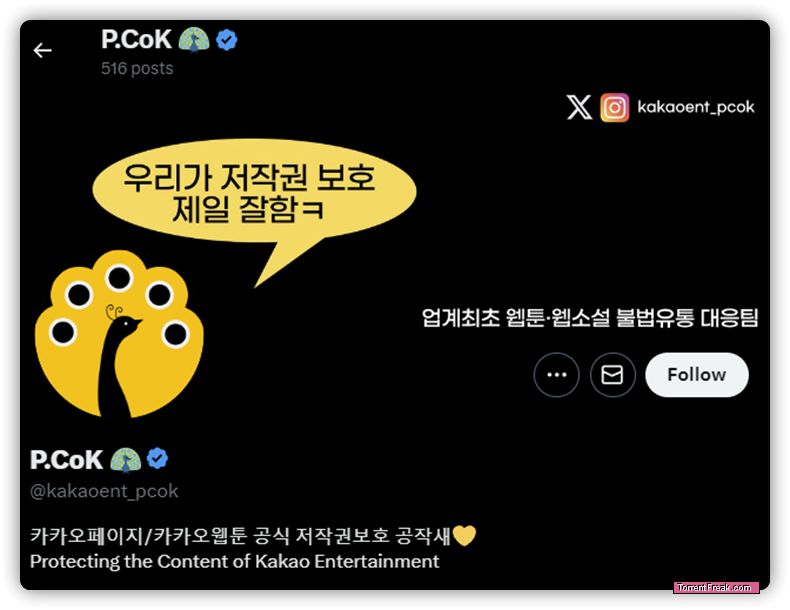
Of course, Kakao is entitled to these freedoms. The company owns the content it seeks to protect and since almost all anti-piracy strategies fail to a greater or lesser extent, trying something different could inject new life and lead to fresh ideas.
That being said, the history books show that some scenarios should be approached with caution; when certain ingredients are combined, there’s a heightened risk of unpredictable results.
Open Source Manga Reader ‘Tachiyomi’ Receives Legal Threats
For the last ten days or so, open source software ‘Tachiyomi’ has found itself under the spotlight following an approach by Kakao’s anti-piracy team. But first, what does the software do? A manga aficionado familiar with the software informed TorrentFreak as follows:
“Tachiyomi is probably the ultimate Android-based manga/webtoon reader with plenty of features and extensibility. The development team behind it has been hard at work for close to 9 years since 2015, and has tirelessly iterated upon it, to create possibly the best kind of reader there is today.”
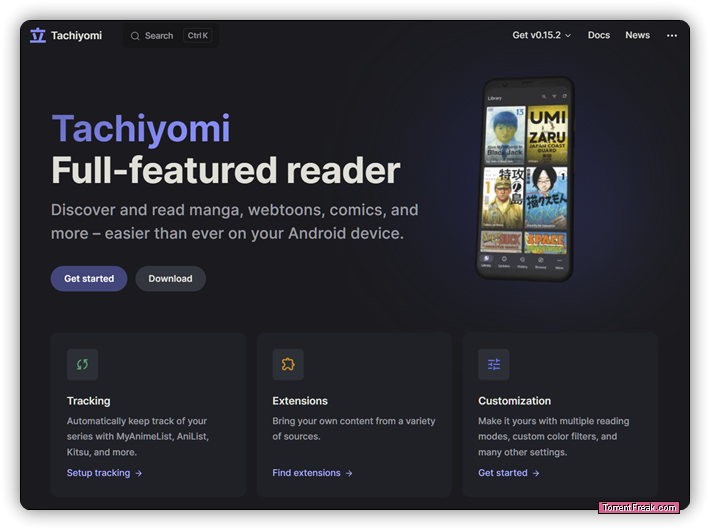
Tachiyomi is free to use, with the added bonus of being completely open source. In common with similar tools, such as web browsers or torrent clients, Tachiyomi contains no third-party content and makes no attempt to lock users into specific sources.
However, through various extensions, users are free to choose their own, including unofficial sources from where it’s possible to download content, including pirated content, without ever paying a penny.
We’re informed that on January 2, 2024, project contributors received communication from Kakao’s representatives who made several demands in respect of this functionality.
A source familiar with events informs TorrentFreak that the main developer of Tachiyomi was instructed to terminate the nine-year-old project by deleting all versions of the app, including those on GitHub.
He was further ordered to delete any comics uploaded to the app, despite the app carrying no third-party content, period. A further demand sought the immediate removal of all Tachiyomi forks on GitHub.
Tachiyomi Begins Removing Extensions
We understand that later on January 2, Tachiyomi’s main developer advised Kakao that the best way to take actual content down would be to file DMCA notices at problematic sites, over which the project has no control. He also offered to help, advising the company that he was willing to remove individual sources from Tachiyomi’s separate extension repo if those were considered an issue.
Three days later, Kakao reportedly presented a spreadsheet that listed allegedly infringing content available from five third-party sites. For one of those sites, Tachiyomi had no extension; for the remaining four, the Tachiyomi team would soon take appropriate action.

New versions of Tachiyomi were released between January 6 and January 8 without a list of extensions being preloaded. Moving forward, those who download Tachiyomi will find that extensions are no longer part of the ‘out-of-the-box’ experience.

January 9: Official Announcement
An announcement on tachiyomi.org dated January 9 spoke of “extenuating circumstances” and a decision to purge extensions to “ensure the long-term sustainability of Tachiyomi.”
“As of now, Tachiyomi is transitioning to a fully bring-your-own-content model. What this means is that you can still enjoy Tachiyomi for manga reading, but you’ll need to source and add your own content,” the statement added.
24 Hours Earlier
As detailed above, the Tachiyomi team responded to Kakao’s complaints quickly and went on to take significant action. Arguably the new versions of the app could’ve been pushed even sooner absent a 48-hour delay to determine certain details.
However, what appeared to be an amicable solution triggered an unexpected Twitter post by Kakao’s anti-piracy team. It implied that installing Tachiyomi carries a risk of viruses.
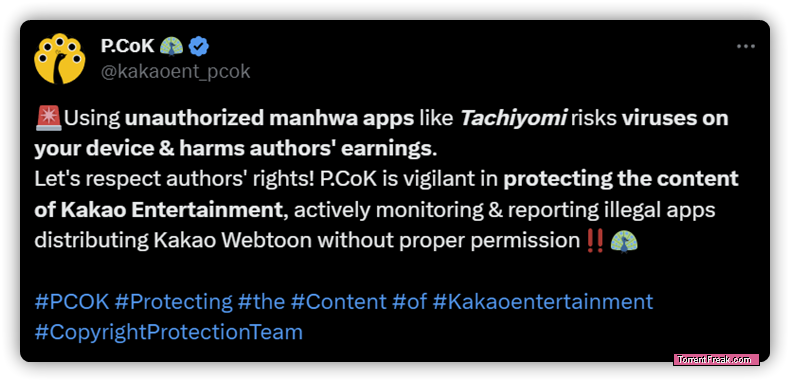
The post has now received 59K views and to quickly summarize the first few dozen responses, people didn’t especially appreciate a long-established open source app being described as a virus risk. One of the more polite responses can be seen below.
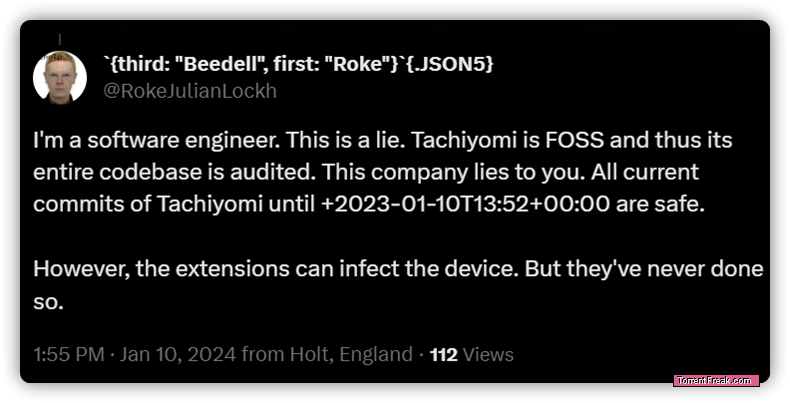
For reasons that can vary from person to person and sometimes between communities, people often feel protective of open source projects. In some respects, their open nature seems to provide a small oasis of trust and when that’s surrounded by free, open source software, any perceived threat risks an unpredictable response.
It appears two can play that game.
January 10: Kakao Threatens Tachiyomi Forks
Having obtained compliance from the Tachiyomi team without a struggle, and then declaring the software a virus risk regardless, on Wednesday Kakao’s anti-piracy team took to Twitter once again, this time to threaten people who forked the Tachiyomi repo.
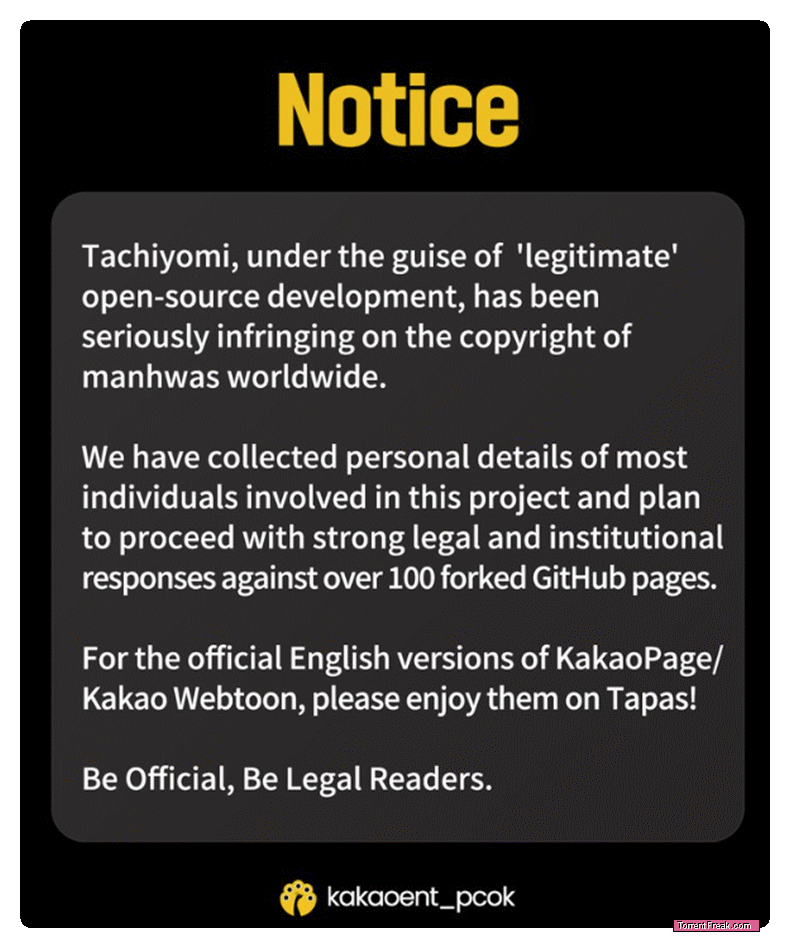
With over 154K views, this post reached a considerably larger audience and prompted almost 500 comments. If any weren’t critical, we apologize for missing them; they aren’t particularly easy to find. The same can’t be said about the Community Notes panel featuring user responses to the claims in the original post.
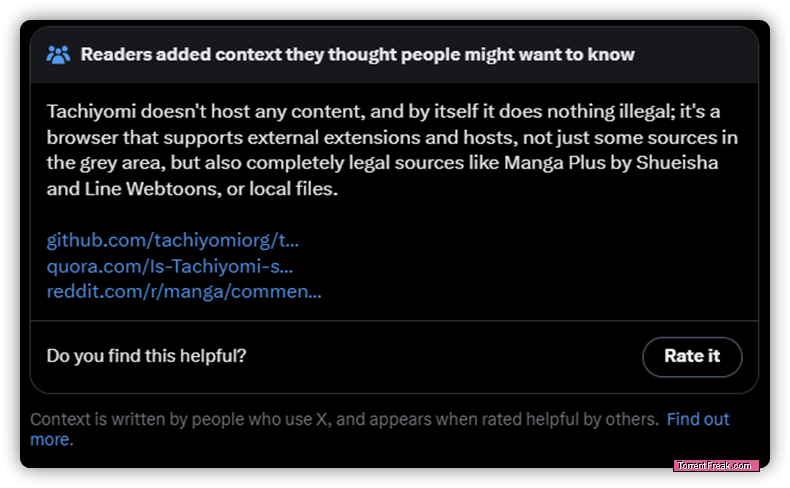
Kakao is a huge company overall so it’s possible that communications policies vary from unit to unit. Anti-piracy issues may even be completely exempt or considered fair game, but it would be interesting to see how the negative results so far dovetail with a report published earlier this month.
According to The Korea Times, reform measures are being prepared to “reverse the negative public sentiment” toward the company in general, not necessarily Kakao Entertainment in its own right, but nothing exists in a vacuum.
At Least Things Didn’t Get Any Worse….Did They?
When any type of site, service, or application is subjected to legal threats, the possibility of unintended consequences or mere fallout is something worth keeping an eye on. From basic DMCA notices through informal discussions to full-blown demands, the overall aim is usually evident from the nature of the requests.
In this case, it appears that a complete end to Tachiyomi or an effective end due to limited functionality, would both amount to the same thing; a massive loss of interest in the software and ultimately, game over. However, while Tachiyomi no longer supports any third-party extensions, it does support third-party repositories, suggesting that extension development and functionality is now the responsibility of others.
Meanwhile, Tachiyomi’s popularity appears to be trending up, not down as intended.
‘GitHub Trending’ is a daily report that features repos trending in popularity on a particular day. Via RSS feeds, trending repos arrive here on a daily basis; this week the Tachiyomi repo has featured in the list, along with at least two others, one of which may have even appeared twice, at least from memory.
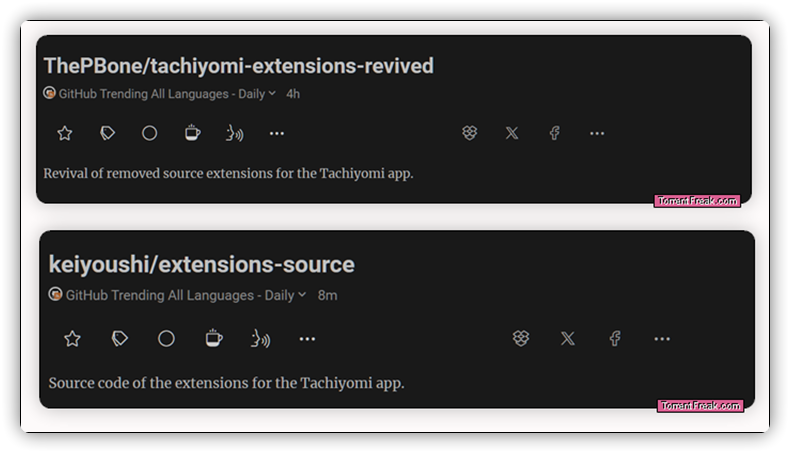
But at least things didn’t get any worse from here, surely? Well….
There are many mechanisms to measure an app’s popularity on GitHub, with some more accessible than others by default. Since receiving a gold star on GitHub is universally considered a positive for most projects, another project on GitHub offers a great way to quickly visualize current and historical star data for a given project.
The image below shows that between December 14 and December 29, Tachiyomi received an average of 15.87 stars each day. In the two weeks that followed, during which Tachiyomi found itself under threat, the daily average more than doubled to 43.92 stars each day.
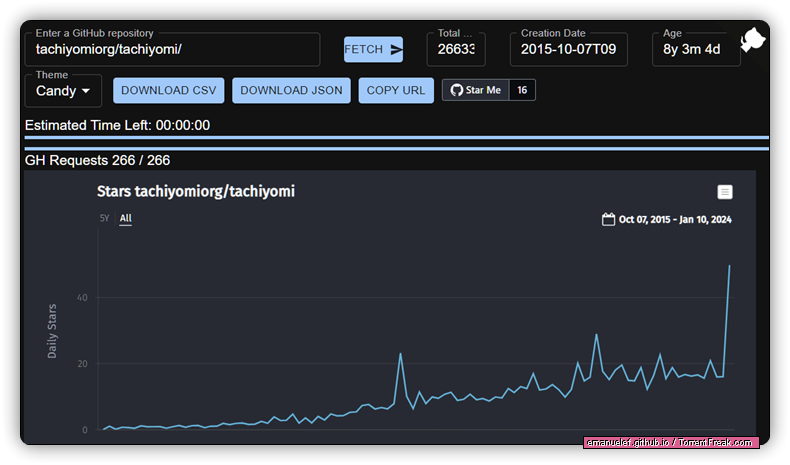
Despite the efforts to shut the project down and the imposition of decreased out-of-the-box functionality, it appears that support for the software actually increased. While somewhat counterintuitive, targeting open source software always risks unpredictable result.
—
Update January 13: There’s a new statement on tachiyomi.org suggesting that the software will no longer be actively developed.
“Tachiyomi will no longer be actively developed. It may continue to work for you for the foreseeable future but there will be no support for it nor the official extensions,” it reads.





